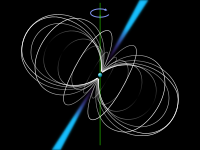
This is a post about complex specified information (CSI). But first, I’d like to begin with a true story, going back to the mid-1960s. A Cambridge astronomer named Anthony Hewish had designed a large radio telescope, covering more than four acres, in order to pick out a special group of objects in the sky: compact, scintillating radio sources called quasars, which are now known to be the very active and energetic cores of distant galaxies. Professor Hewish and his students were finally able to start operating their telescope by July 1967, although it was not completely finished until later on. At the time, Hewish had a Ph.D. student named Jocelyn Bell. Bell had sole responsibility for operating the telescope and analyzing the data, under Hewish’s supervision.
Six or eight weeks after starting the survey, Jocelyn Bell noticed that a bit of “scruff” was occasionally appearing in the data records. However, it wasn’t one of the scintillating sources that Professor Hewish was searching for. Further observations revealed that it was a series of pulses, spaced 1.3373 seconds apart. The pulses could not be man-made, as they kept to sidereal time (the time-keeping system used by astronomers to track stars in the night sky). Subsequent measurements of the dispersion of the pulse signal established that the source was well outside the solar system but inside the galaxy. Yet at that time, a pulse rate of 1.3373 seconds seemed far too fast for a star, and on top of that, the signal was uncannily regular. Bell and her Ph.D supervisor were forced to consider the possibility of extraterrestrial life. As Bell put it in her recollections of the event (after-dinner speech, published in Annals of the New York Academy of Sciences, vol. 302, pp. 685-689, 1977):
We did not really believe that we had picked up signals from another civilization, but obviously the idea had crossed our minds and we had no proof that it was an entirely natural radio emission.
The observation was half-humorously designated Little green men 1 until a famous astronomer, Thomas Gold, identified these signals as rapidly rotating neutron stars with strong magnetic fields, in 1968. The existence of these stars had been postulated as far back as 1934, by Walter Baade and Fritz Zwicky, but no-one had yet confirmed their existence when Bell made her observations in 1967, and only a few astronomers knew much about them.
Here’s a question for readers: was Bell wrong to consider the possibility that the signals might be from aliens? Here’s another one: if you were searching for an extra-terrestrial intelligence, what criteria would you use to decide whether a signal came from aliens? As we’ll see, SETI’s criterion for identifying alien signals makes use of one form of complex specified information. The criterion – narrow band-width – looks very simple, but it involves picking out a sequence of events which is highly surprising, and therefore very complex.
My previous post, entitled Why there’s no such thing as a CSI Scanner, or: Reasonable and Unreasonable Demands Relating to Complex Specified Information, dealt with complex specified information (CSI), as defined in Professor William Dembski’s paper, Specification: The Pattern that Signifies Intelligence. It was intended to answer some common criticisms of complex specified information, and also to explain why CSI, although defined in a mathematically rigorous manner, is not a physically computable quantity. Briefly, the reason is that Professor Dembski’s formula for CSI contains not only the physically computable term P(T|H), but also the semiotic term Phi_s(T). Specifically, Dembski defines the specified complexity Chi of a pattern T given chance hypothesis H, minus the tilde and context sensitivity, as:
Chi=-log2[10^120.Phi_s(T).P(T|H)],
where Chi is the specified complexity (or CSI) of a system,
Phi_s(T) is the number of patterns whose semiotic description by speaker S is at least as simple as S’s semiotic description of T,
P(T|H) is the probability of a pattern T with respect to the most plausible chance hypothesis H, and
10^120 is the maximal number of bit operations that the known, observable universe could have performed throughout its entire multi-billion year history, as calculated by theoretical computer scientist Seth Lloyd (“Computational Capacity of the Universe,” Physical Review Letters 88(23) (2002): 7901–4).
Some of the more thoughtful skeptics who regularly post comments on Uncommon Descent were not happy with this formula, so I’ve come up with a simpler one – call it CSI-lite, if you will – which I hope will be more to their liking. This post is therefore intended for people who are still puzzled about, or skeptical of, the concept of complex specified information. Read More ›
